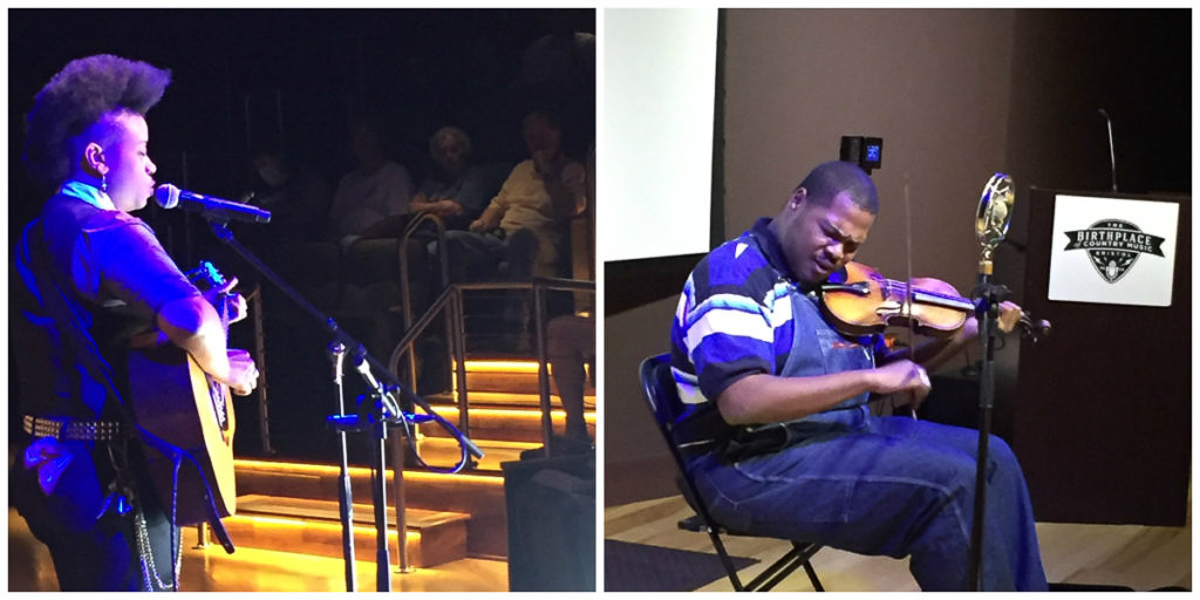Today is Martin Luther King Jr. Day, and organizations in the Tri-Cities area are marking this date with a variety of programs over the course of the month. For instance, later this week, our Museum Talk hosts will be chatting with Richard Josey, founder of Collective Journeys, about his DEAI (Diversity, Equity, Accessibility, Inclusion) work with the Virginia Association of Museums.
We also contributed a country music playlist for the Appalachian Peace Education Center’s MLK Day programs this past weekend. Country music has been influenced by a wide variety of different musical traditions over the years. Enslaved people from Africa brought the knowledge and memory of the banjo – a common instrument in country and bluegrass – with them when they were forcibly transported to these shores. And since its early days in the 1920s, Black artists have contributed to the history and sound of country and old-time music. Our playlist celebrates several of those artists.
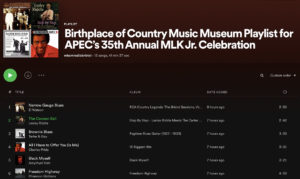
The museum’s Spotify playlist to mark Martin Luther King Jr. Day 2022.
El Watson, Tarter & Gay, and the Tennessee Chocolate Drops played on early country music recording sessions in East Tennessee (though their songs were categorized at the time as “race records” rather than “hillbilly records”). El Watson was the only African American musician to record at the 1927 Bristol Sessions, putting down two songs: “Narrow Gauge Blues” and “Pot Licker Blues.” He also played bones on a few songs recorded by the Johnson Brothers, and Charles Johnson played guitar on Watson’s recordings – these are some of the earliest integrated recordings in country music. Ralph Peer of the Victor Talking Machine Company came back to Bristol in 1928 to record more musicians from this area, and this time the sole African American act was a duo called Tarter & Gay. As with El Watson, they recorded two sides – “Brownie Blues” and “Unknown Blues” – that were marketed as race records. The Tennessee Chocolate Drops – made up of brothers Howard and Roland Armstrong and Carl Martin – recorded “Knox County Stomp” for Vocalion at the Knoxville Sessions in 1930.
Lesley Riddle worked with A. P. Carter as they traveled around Southern Appalachia to collect songs for The Carter Family to perform and record. He also taught them several songs, including “The Cannon Ball,” and his guitar playing influenced Maybelle Carter’s guitar style. Riddle later moved to Rochester, New York, where he sometimes played music in small venues around the city in the 1960s and 1970s. He met Mike Seeger in 1965 and recorded music for him and performed as part of the urban folk revival.
Elizabeth Cotten, guitarist and banjo player, was an important influence in American folk music; her connection to the Seeger family, especially Mike Seeger, played an important role in her amazing musical talent being recognized and celebrated. Her style and repertoire – based on earlier African American music and instrumental traditions and delivered in her unique left-handed playing – impacted a variety of musicians who followed her. Honored as a National Heritage Fellow in 1984 and winner of a Grammy at the age of 90, the Smithsonian recognized her as a “living treasure” before her passing in 1987.
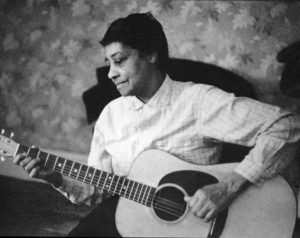
Elizabeth Cotten playing guitar. Credit: Library of Congress
Brownie McGhee, born in Knoxville but raised in Kingsport, made his mark in music locally, but also put down songs for a recording session in Chicago in the 1940s. Alan Lomax later recorded McGhee, providing an important record of his musical talent – and as with other Black musicians whose music intersected with early traditional and old-time music, he was also active in the folk revival. McGhee recorded “Sittin’ Pretty” with fellow artist Sonny Terry.
DeFord Bailey, a talented harmonica player, was the first African American artist to perform on the stage of the Grand Ole Opry in Nashville in the 1920s. Bailey was nicknamed “the harmonica wizard” by George Hay, WSM’s station manager – one of his most famous pieces on the show was “Pan American Blues,” which recreated the evocative sounds of a locomotive. Bailey recorded for various labels and performed live throughout the South and Midwest, but sadly his music career was curtailed by a business dispute; he later opened a shoeshine parlour.
These early African American performers gave way to later musicians who have made their own mark on country and old-time music. Charley Pride, once a Negro league professional baseball player, rose to fame in the late 1960s and early 1970s. He became a very popular country music star and is one of only three Black members of the Grand Ole Opry. “All I Have to Offer You (Is Me)” was his first number one hit.
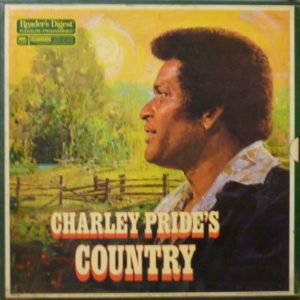
Album cover for Charley Pride’s Country, released in 1979 by Reader’s Digest.
Dom Flemons and Rhiannon Giddens are founding members of the Carolina Chocolate Drops, an important Black string band; they now have thriving solo careers. Both artists use their music to illuminate African American histories. In 2018, Flemons released an album focused on Black cowboys through Smithsonian Folkways. He chose to feature “Lonesome Old River Blues,” a song originally recorded by Roy Acuff and the Crazy Tennesseans in the 1930s, on this album in order to illuminate the influence of African American traditions on early country music. Giddens’ musical output has consistently helped to tell the story of the Black experience, and she recently led an all-female banjo “supergroup” called Our Native Daughters that shares African American histories and stories from the female perspective. Her version of “Freedom Highway,” a 1964 Civil Rights protest song, is taken from her second solo studio album and features fellow artist Bhi Bhiman.
Amythyst Kiah, a local musician and singer from Johnson City, Tennessee, did her degree at ETSU in the Bluegrass, Old-Time, and Country Music program and contributed to the exhibit content at the Birthplace of Country Music Museum. She is part of the Our Native Daughters group and has recently released a new Rounder Records solo album, Wary + Strange. Her song “Black Myself” was first released on Songs of Our Native Daughters and then re-released on Wary + Strange – the song’s powerful lyrics, coupled with Kiah’s amazing voice, pack a real punch.
Jerron “Blind Boy” Paxton is a young singer and multi-instrumentalist originally from the Watts district of Los Angeles, California. His playing styles are akin to pre-WWII blues and jazz in the vein of artists like Fats Waller, Bessie Smith, and Lonnie Johnson. The Southern roots of his grandparents who moved from Louisiana to California in the mid-1950s provided the influence that became his signature sound. The song we feature is “Railroad Bill,” the B-side of a single released on Evangelist Records of London, England, which also happens to be a product of his first-ever professional recording session. Paxton has appeared in the documentary film The American Epic Sessions, as well as voicing a character in the animated miniseries Over the Wall. We have been very lucky to have Paxton play here at the Birthplace of Country Music Museum and the Bristol Rhythm & Roots Reunion Festival.
Texas-born Charley Crockett is a blues, country, and Americana singer-songwriter with 15 albums under his belt starting with 2015’s A Stolen Jewel through to his 2021 release Music City USA. Crockett has been steadily gaining popularity and is an established part of authentic roots music’s current youth movement. Also having appeared at the Bristol Rhythm & Roots Reunion, Crockett has garnered a faithful local fanbase. The track “Jamestown Ferry” is a mid-tempo honkytonk number from 2017.
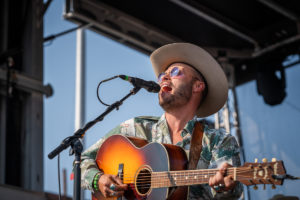
Charley Crockett performing on stage at Bristol Rhythm & Roots Reunion in 2021. © Birthplace of Country Music; photographer: Billie Wheeler
These African American artists are just a few of those that have made their mark on roots, country, and old-time music. We hope you enjoy our playlist, and that it leads you deeper into this history and music!
About the Authors
René Rodgers is Head Curator at the Birthplace of Country Music Museum. Scotty Almany is the museum’s Digital Media, Programming, & Exhibit Logistics Manager.


